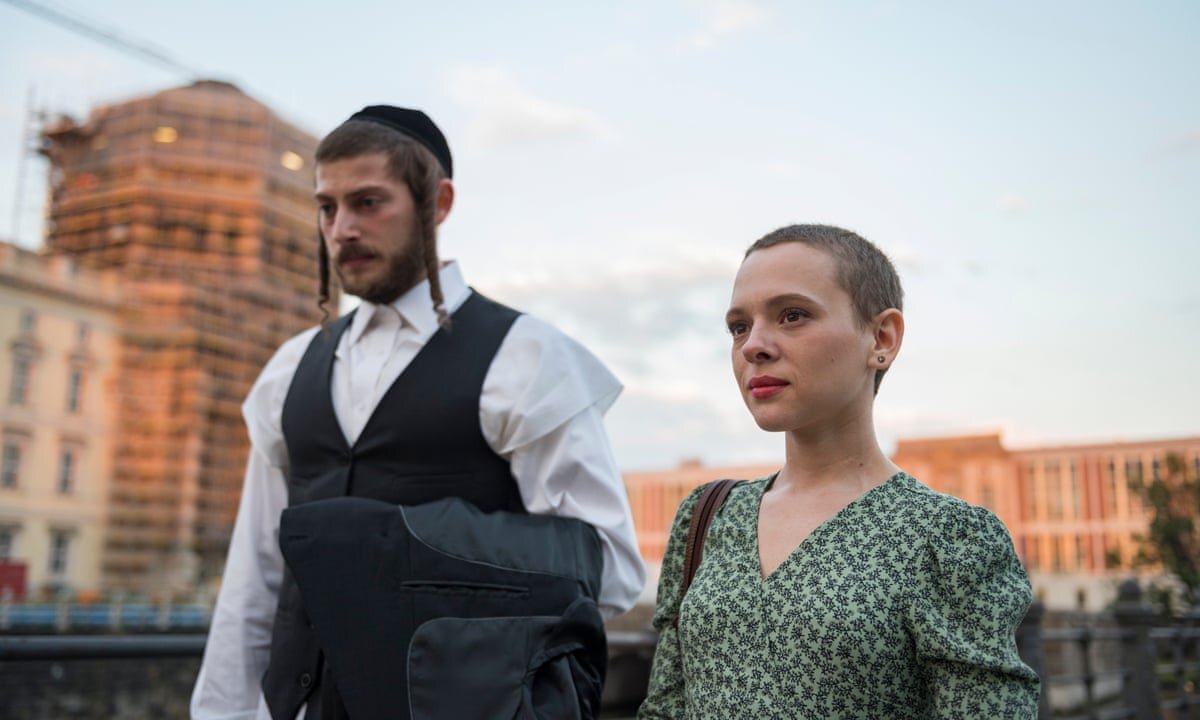Unorthodox Is Exactly That: Unorthodox
After watching (and subsequently LOVING!) Shtisel, I was excited when I heard that Netflix was developing a miniseries on ultra-Orthodox, Hasidic Jews. At the same time, I was hesitant — was Netflix just trying to make a new show that would be as big a hit as Shtisel?
I can’t know for sure if that was the intention, but it certainly wasn’t the result.
Unorthodox tells the story of Esther Schapiro, a young, ultra-Orthodox woman who escapes her Hasidic community and travels to Berlin to start a new life. Her husband, Yanky, and his cousin, Moishe, go searching for her in Berlin. The story is told using flashbacks, so the audience gets to see both Esther’s life leading up to her escape and her present-day journey.
The show is based on a memoir of the same name by Deborah Feldman. The novel is about her departure from her insular, Hasidic Jewish community. I have not read it, — I’ll check it out as soon as the library reopens! — but every time something is adapted from literature to screen, some things always change. I note this because, as much as there are things to criticize about the show, it’s important to remember that it’s based on a real experience, and that experience should be respected.
With that said, the Unorthodox miniseries comes off as just the opposite of a personal experience. It is incredibly sensationalized, feeling like just another “Hasidic Jew escapes oppression” show among so many others of its kind, including Netflix’s own 2017 documentary, One of Us. The characters in Unorthodox have little emotional complexity and even less development over the course of the series. From point A to point B, what you see is what you get: Esther is completely on one extreme, with no intention of ever engaging with her previous life again, while her husband, Yanky, is on the other, portrayed as nothing but a brainwashed young man who can’t think for himself. At the end of the show he is given a small moment of redemption, where he seems a little more human, but that ends up feeling out of place because he isn’t given a journey up until that point.
As someone who knows Hasidic Jews, I find these stereotypical figures troubling. Hasidic Jews, much like all people, are thinking and feeling human beings who make decisions for themselves. Their ultra-Orthodox communities indeed abide by a strict set of rules, and for many, those rules become too much. But, there are those who live happily in Hasidic communities, and no matter what decision someone makes about whether or not they want to have that lifestyle, it’s still that - a decision. I am often disturbed by portrayals of Hasidic Jews as nothing but one-track-minded robots.
Another confusing element of the show is its timeline. Everything seems to happen in the span of a week — Esther leaves her Brooklyn community, takes off her head covering and rejects all the modest clothes she used to wear, eats ham (a big no-no in Judaism), goes out partying and drinking, and at the end of that week, she even sleeps with a non-Jewish guy she only recently met. While she may have chosen to do all of those things eventually, the way it plays out in the story seems forced. Again, it’s a product of what I’ll call “character extremism”: the moment Esther chooses to leave, she must immediately reject everything about her past in a matter of days. It’s simply unrealistic.
One thing that I think may contribute to the problems I outlined is the lack of personal understanding of the Hasidic community among the show's core team of creators. While writers Anna Winger and Alexa Karolinski are Jewish, and director Maria Schrader has worked on countless projects about Jews during World War II, creating a show about Hasidic Jews requires a more nuanced understanding. That’s where a show like Shtisel finds itself at an advantage - one of its writers came from a Hasidic community, so he not only understood the communal reality but also felt a certain nostalgia for it. In Unorthodox, everything feels a lot more black and white, which is exactly how it would feel to an outsider.
With all of the criticism, it is still worth noting that the actress who plays Esther, Shira Haas, is a star. At just 24, she approaches every scene with the maturity and gravitas of someone many times her age. When Shira Haas cries, she cries. You can’t help but feel drawn into her pain. She is also known for her powerful role in Shtisel, also of a Hasidic girl.
There must be a reason why so many people have been drawn to watching Unorthodox, and I assume it’s because at the end of the day, it’s riveting. There is love, drama, conflict - the perfect recipe for binge-watching. But, there is also a tremendous lack of authenticity and complexity, which makes it difficult to relate to. There’s so much to explore in the world of ultra-Orthodox Jews, and this show doesn’t do it.
